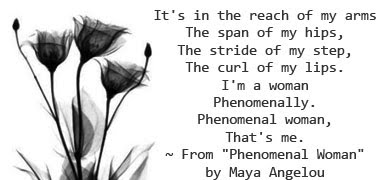There is one thing that became particularly clear in my own research (and believe me, I would love to cite myself here, but that time has not yet come) on femininity, womanhood, and the meaning that women attribute to being women, and that is that we are caretakers. We take care of everything and everyone around us. We are often sacrificial, we are often patient and sensitive to the needs of others, and we are often not encouraged to develop our own interests or paths in life, but to act in the interests of others. Women in my study (and they were of a particular cultural background and demographic, but I see this anecdotally across the spectrum) had a hard time defining themselves as autonomous, internally-stable beings. Their ideas and feelings about their selves were overwhelmingly defined through the well-being of others, and their sense of worth depended not on personal achievements, but on the successes of the people in their lives.
Since I've decoded these findings, I have struggled to make sense of them and to understand if being caretakers is really such a bad thing. Sure, having no personal sense of self does not seem so great, psychologically-speaking. But many of these women will say that they truly find meaning in taking care of those around them. They see this as their special skill and even as something that sets them apart from men. So why, in our efforts to equalize gender roles, would we want to take this away from women by demanding that men also contribute to the caretaking of others?
My answer came in this UN Commission on the Status of Women report from 2009. It explained that women across the globe are overburdened with the task of caretaking. In impoverished areas, women are left to care for the sick, those with HIV, the ailing, the dying. As men leave home for different cities or countries in search for work, women are left to run whole communities, yet this work is unrecognized in the rights and the amount of power that these women receive in those communities. In industrialized societies, women are also forced to choose between career and family, when affordable and accessible childcare, as well as adequate maternity/paternity leave, are still largely uncommon.
It seems then that women truly hold the weight of the world on their womanly shoulders and this weight of our world is perhaps only getting heavier. The problems or successes of men, children, the elderly, and other women become a personal responsibility and a judgment of character for many women and this fact just seems unfair and overwhelming. Men must step in to help women manage all this exhausting caretaking. They are equally as capable of carrying the weight of others, and with us working together on egalitarian terms, we can perhaps take care of each other, succeed at our own skills, and feel as the equal, productive and self-actualized beings we all can be.
skip to main |
skip to sidebar



Pages
From Cat Lady to Femme Fatale, from Paris Hilton to Ani DiFranco, from Beyoncé to Toni Morrison... what does it mean to be a woman today?
.

.
WELCOME
I am a graduate student and I study people and contexts. In my spare time, I like to think about the status of women in today's world: what we are to do and who we are to be. This blog started as a way to jot down my thoughts and deconstruct situations. I'm glad you're here; please come on this journey with me.
CONTRIBUTE!
If you would like to post something here--maybe you just thought of a feminist critique for the latest Glee episode, or perhaps you wanted to talk about that disempowering experience you had with your boss--send me an email to: larusse [at] prostokvasha [dot] com.
.
LINKS & UPDATES
ARCHIVES
LABELS
body image
(7)
men and women
(5)
motherhood
(5)
self-image
(4)
sexuality
(4)
around the web
(3)
equality
(3)
femininity
(3)
feminist images
(3)
feminist language
(3)
speak up
(3)
feminism
(2)
girlhood
(2)
printed media
(2)
Russian women
(1)
abortion
(1)
around the globe
(1)
dance
(1)
defining yourself
(1)
list
(1)
movies
(1)
music
(1)
tv
(1)
violence against women
(1)
Copyright 2012
We Are Phenomenal. Powered by Blogger.
Template created by Deluxe Templates.

0 comments:
Post a Comment